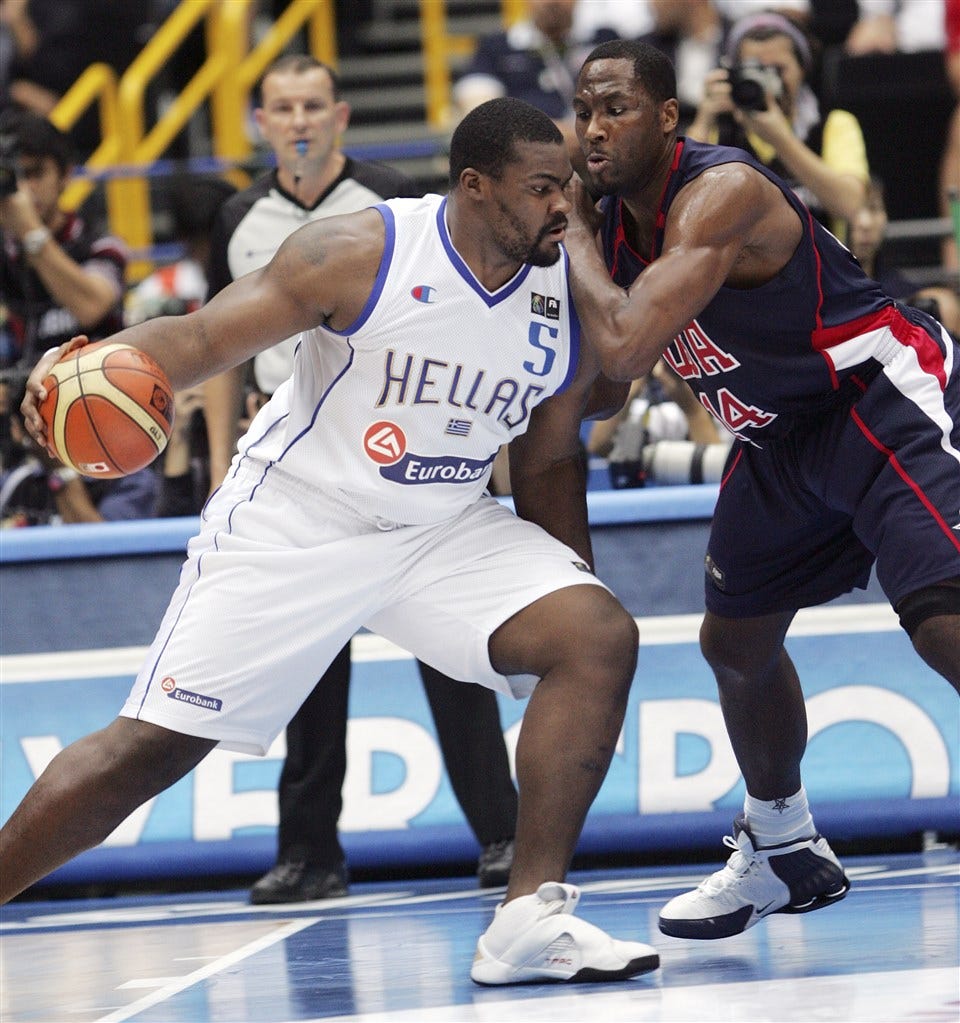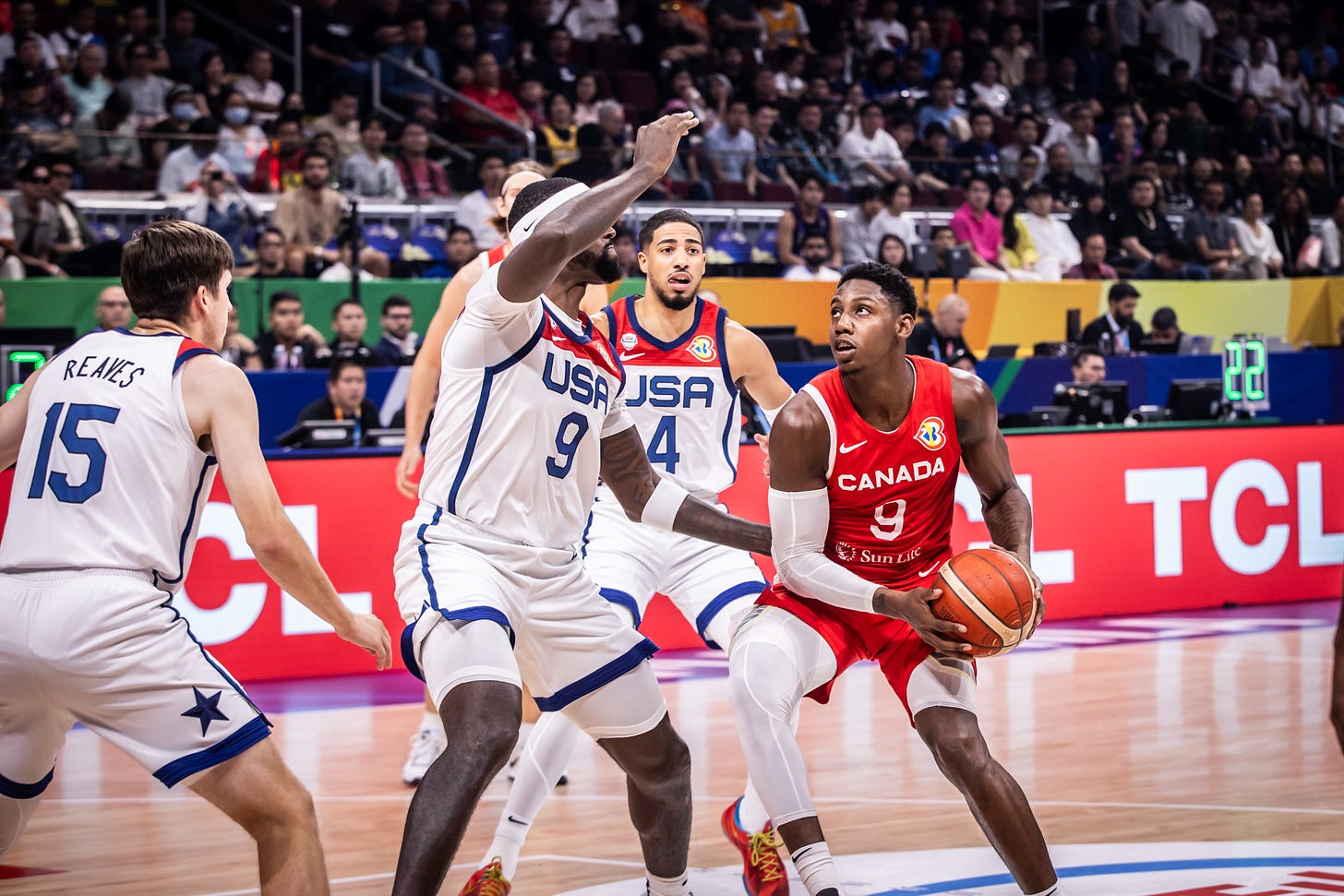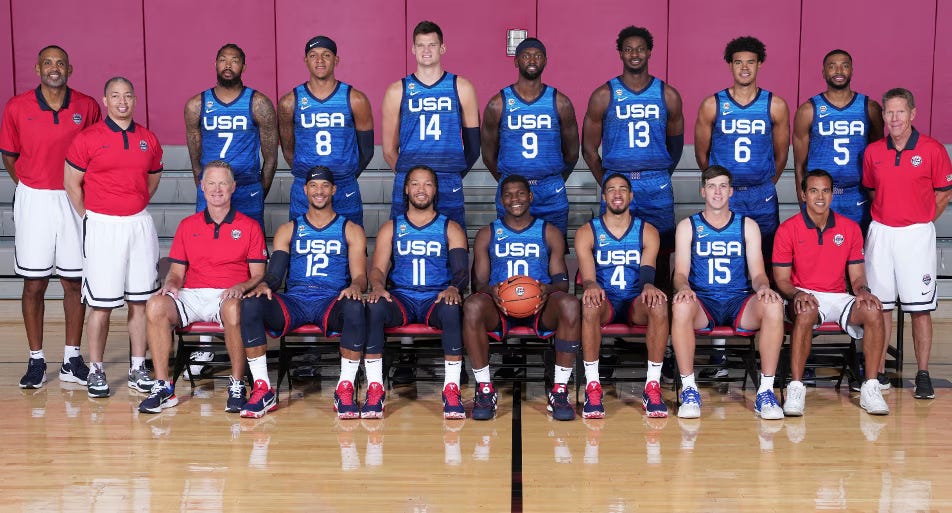American Exceptionalism without National Pride
Do we have what it takes to still be the best in the world in basketball?
Basketball has always been a love of mine and as an American who has lived abroad for the past nine years, I have been able to see the NBA and basketball as a whole from the perspective of people outside of the United States. I actually watched the France vs. Spain quarterfinals of the 2014 FIBA World Cup at the airport while awaiting my flight to London when I first moved to Europe. In a way this tournament, in which the United States would eventually win the gold medal was my sendoff. In Lisbon, Portugal, where I currently reside, many of my friends are huge basketball fans, dedicating late nights to watch NBA live games. But their love of basketball is not just limited to the NBA, it begins there. Like many people in Europe, international tournaments such as Eurobasket, the FIBA World Cup, and the Olympics are also seen as important events where basketball talent from all over the world is showcased.
In the United States these events with the exception of the Olympics are barely given attention. Most people wouldn’t even know where to begin to try to watch Eurobasket. If the United States games in the FIBA World Cup were not on ESPN2, I doubt many basketball fans would have been aware when or where the team was even playing. Despite this ambivalence, Americans have been up in arms in recent days following the United States national team’s failure to medal at the tournament. The team lost three of their final four games including dropping the semifinal match to Germany and the bronze medal game to Canada.
Recently Dennis Schröder, who just led Germany to the FIBA World Cup gold medal, has been on the receiving end of this outrage in the United States for his comment that the German national team this year was the best team he’s ever played on. The American media has taken offense at the notion that a national team that features Daniel Theis, Moritz Wagner and Franz Wagner, could possibly be better than the Los Angeles Lakers which feature names such as Lebron James and Anthony Davis. There is an irony to this given that Schröder was not on the 2020 NBA champion Lakers roster. He was acquired afterward. Americans are offended at the notion that an actual championship roster, of the German national team, is a better team than a Los Angeles Lakers team that was a play-in team and seventh seed overall in 2021, and later on in 2023 when Schröder returned, was a seventh seed again, but made it to the Western Conference finals where they were swept by the eventual NBA Finals champion Denver Nuggets. Even by American standards where winning is everything, this German national team is the best team Schröder has played on.
There is something deeper though underlying the ire that Schröder has drawn: American exceptionalism. There is an inherent assumption amongst Americans that the collection of stars that makeup not only the United States national teams historically, but also many NBA teams, are by their very nature superior to any collection of talent that make up teams in other countries. In typical American fashion, the individual is the most celebrated. When the United States puts teams together, nobody cares the about the quality of team being assembled or the compatibility of the players. All that matters is the names that are being sent. And just as the expectations from American fans that we send our stars who are expected to demonstrate the asymmetrical gap in individual talent, the players take it upon themselves to play a brand of hero ball that showcases that individual talent and make highlight reels all over the world. But this brand of basketball is quickly becoming untenable to play in international tournaments and still expect to be the best.
It is puzzling to many people seeing Schröder, who as an individual is a quality player in the NBA, but nowhere near the star as his former teammates such as Lebron James, Anthony Davis, or Shai Gilgeous-Alexander, not only win a gold medal, but also be the team leader and best player on such a team. “Why can’t he play like that here?” some wonder. One of the biggest reasons for Schröder’s elevation of play in FIBA, is the national pride that underlies his willingness to do whatever it takes to put his national team in a position to win. When they need him to, he is a team player and facilitator. When the team needs to score at the end of a tight game, they have the trust in Schröder, no matter how many shots he’s missed before, to put the team on his back and make the right play that will result in a bucket. In short, he plays on a team that plays team basketball. In that regard Germany was indeed the best “team” of the tournament.
Americans do not have the amount of national pride that players do in other countries, players who place a high importance on the opportunity to play for their national teams. When Luka Dončić or Dennis Schröder choose to represent Slovenia and Germany respectively, there is a level of pride that compels them to play, no matter how fatigued they are from the previous NBA season. In this context, no individual is bigger than the team. For a myriad of reasons, American players have put their NBA careers and contracts, and their own personal brands ahead of the opportunity to represent the country in the FIBA World Cup and for the second World Cup in a row have left the bulk of this responsibility to be shouldered by the inexperienced young talent of the league.
This is slowly starting to change now as international players become more and more Americanized from their time in the United States. Giannis Antetokounmpo and Joel Embiid are examples of players who have placed a higher importance of their obligations, for whatever reasons, to the numbers on their contracts over playing for their country. Joel Embiid can’t seem to figure out what country he should play for when he eventually will make a decision on the 2024 Olympics. With Cameroon not qualifying for any national tournaments, Embiid is faced with a choice between playing for the United States or France. If he were to choose to represent the red white and blue of the American flag over the blue white and red of the French “tricolore”, he would fit right with his fellow American NBA players.
This moment in which team USA finds itself is a moment that I have seen repeat over my time in watching international basketball. This very scenario nineteen years ago was my introduction to international basketball, with team USA finishing with the bronze medal in the 2004 Olympics and the 2006 FIBA World Cup. In 2004, I had high expectations of glory for team USA. I had heard the legends of the Dream Team and how dominant the Men’s national team had truly been in the previous decade. Little did I know that these two tournaments would become a humbling introduction for me watching international basketball.
To this day I get shivers from hearing names such as Šarūnas Jasikevičius of the Lithuanian national team, Manu Ginobili’s dominance with Argentina, or the absolute evisceration of team USA’s big men by the Greek center Sofoklis Schortsanitis, who earned himself the nickname Baby Shaq. I learned at a very young age not only the differences in international basketball, but also not to underestimate the breadth of talent of players outside of the United States.
It wouldn’t be until 2008 that I would get to experience a gold medal victory when I stayed up until 4 in the morning watching the nail-biting final between the United States and Spain. What this victory taught me was not to expect gold medals when the best NBA players committed themselves. I learned that these victories had to be earned and no team could be taken lightly, no matter if Kobe Bryant or Lebron James were suited up in red, white and blue.
From that point on the United States put together quality teams that not only fit international play well, but also played well together with great chemistry. The commitment of players like Kobe Bryant, Lebron James mainstreamed the image of representing the United States with honor and pride. Every subsequent NBA superstar wanted to follow in their footsteps and win gold. But it seems that the majority of the country and the basketball scene at large in the US have taken the wrong message from these impressive showings from 2008-2016. They have taken for granted just how difficult it is to win in international basketball, which is one of the most popular sports in the world.
Fast forward to today with the recent failure of the United States national team to medal at the FIBA World Cup, the second failure in a row, many narratives have emerged that seek to explain the loss. Some simply say this is our C team. We are not sending our best. If we did we would win easily. That narrative is not only disrespectful to the efforts of the players who chose to compete, it’s also disrespectful to other countries around the world that field formidable teams year in and year out. It also displays a lack of awareness how how poorly American teams have fared historically, that are constructed solely out of star power.
Another narrative that has appeared is that the World Cup doesn’t matter and that the Olympics will be the year the US fields a team that will win gold, just as they did in 2021. This narrative is evidenced by the amount of players that are vocally annou
ncing their interest to play in the 2024 Olympics just a day after Canada beat the US in the bronze medal game. These very same players declined to compete in the World Cup this summer and in 2019. There is an irony in the avengers assembling as we speak to right this perceived wrong. This narrative of World Cup irrelevance ignores the fact that the United States is actually the country that holds the most World Cup gold medals with five. The only other country to have this many is the defunct country of Yugoslavia. It also minimizes how difficult these past two Olympics have been to win. In 2021, without the heroic contributions of Kevin Durant who played basketball at an unrivaled level that summer, this point would not even be a discussion.
A more nuanced narrative is to attack the coaching philosophy of head coach Steve Kerr, whose small ball play has taken over the NBA with the success of the Golden State Warriors. Kerr’s style is the embodiment of the modern NBA and for some this played into a narrative of a soft NBA that has gone astray from the “true” way to play basketball. They portray Kerr as the ignorant American who had no idea of how the physically superior international basketball was played. This ignores the fact that the team was built to embrace its glaring flaw of lack of size that international play requires. Every team has flaws that can be exploited tactically. The one that had the least, team Germany, ended up winning the title and deservedly so. The issue at hand was not Kerr’s philosophy. Let us not forget that the team was an Anthony Edwards three-pointer away from going to the gold medal game with its flaws and all.
Among other ridiculous narratives going around was that some Americans were actively rooting against the team because they do not like the style of play in the NBA. Because the NBA players are “soft” they deserved to get bullied around by the tougher international play. The NBA is at fault once again.
All of these narratives display a general disregard for international basketball talent in the implicit assumptions that American players are inherently better and we as a country just need to demonstrate that to put the world back in their place. It is American exceptionalism at its finest. But this exceptionalism is lacking any notion of pride in being American. Americans do not watch these games, and the television networks don’t make it any easier. Most people I know had no idea the FIBA World Cup was happening due to poor advertising in the country, and it wasn’t helped by the fact that ESPN placed most of these games behind the paywall of ESPN+ with the exception of USA games. It is especially telling that ESPN decided not to broadcast the gold medal game, or the bronze medal game that featured the much anticipated USA vs. Canada matchup. The message is very clear: If the USA isn’t competing for the gold, who cares who wins?
For all these attempts to explain the reason the USA failed to medal, one reality is rarely outwardly acknowledged. They got beat in the details. Issues didn’t boil down to personnel or any overarching philosophical issue. It came down to lack of in game adjustments, poor scouting, and poor execution of the scouting report by players at key moments. These are the nuts and bolts of team basketball. They constructed a gold medal capable roster, but they were outclassed tactically when it mattered. They simply were not the best “team”. Many people, the players included operate with the assumption that NBA players can just “turn it on” and play hero ball when they need to. But this placed them in too big a hole to dig themselves out. No hero was going to save them as Kobe Bryant did in 2008 or Kevin Durant did in 2021. Mikal Bridges tried, but it wasn’t enough. The American basketball world at large could take a page out of the example set by the late great Kobe Bryant and represent the country with dignity and pride. The kind of dedication that would lead them to treat every opponent as a game seven matchup, as Kobe did in 2008. Despite their failure to medal, I enjoyed watching this iteration of team USA play from exhibition to their final moment. I commend their effort to dedicate the end of their summer toward the goal of earning a gold medal and I hope to see at least some of them back for the Olympics next year.
With the NBA season approaching and the 2024 Olympics coming directly after, we seem to still believe that we can send in calvary and restore American dominance to the basketball world. And even if we are able to do so, can the same brute force winning be replicated 2027 World Cup or the 2028 Olympics? Will the United States even still be home to the best players in the world? Or will they finally wisen up and finally attempt to send the best “team” in the world?








Brilliant, as usual!